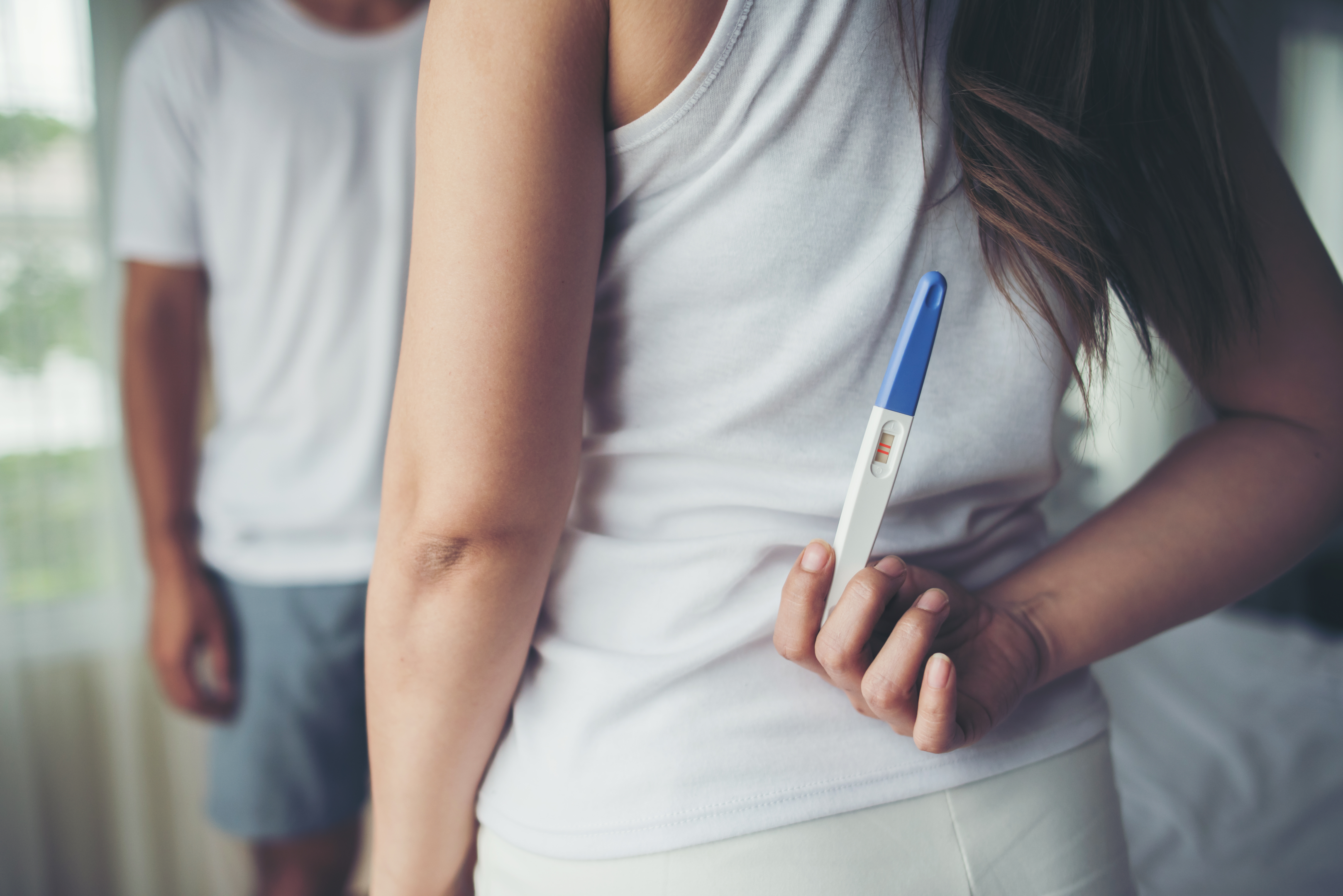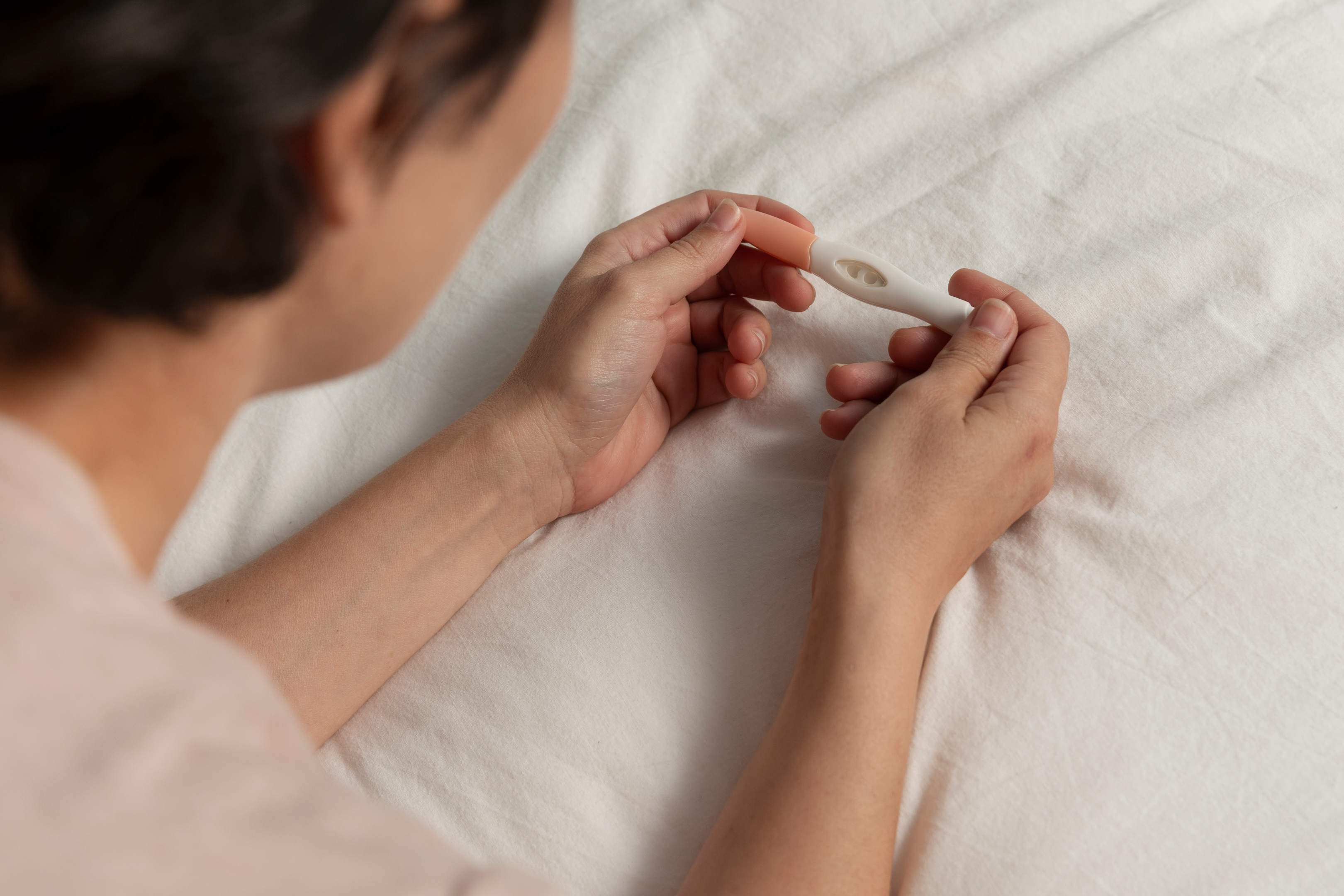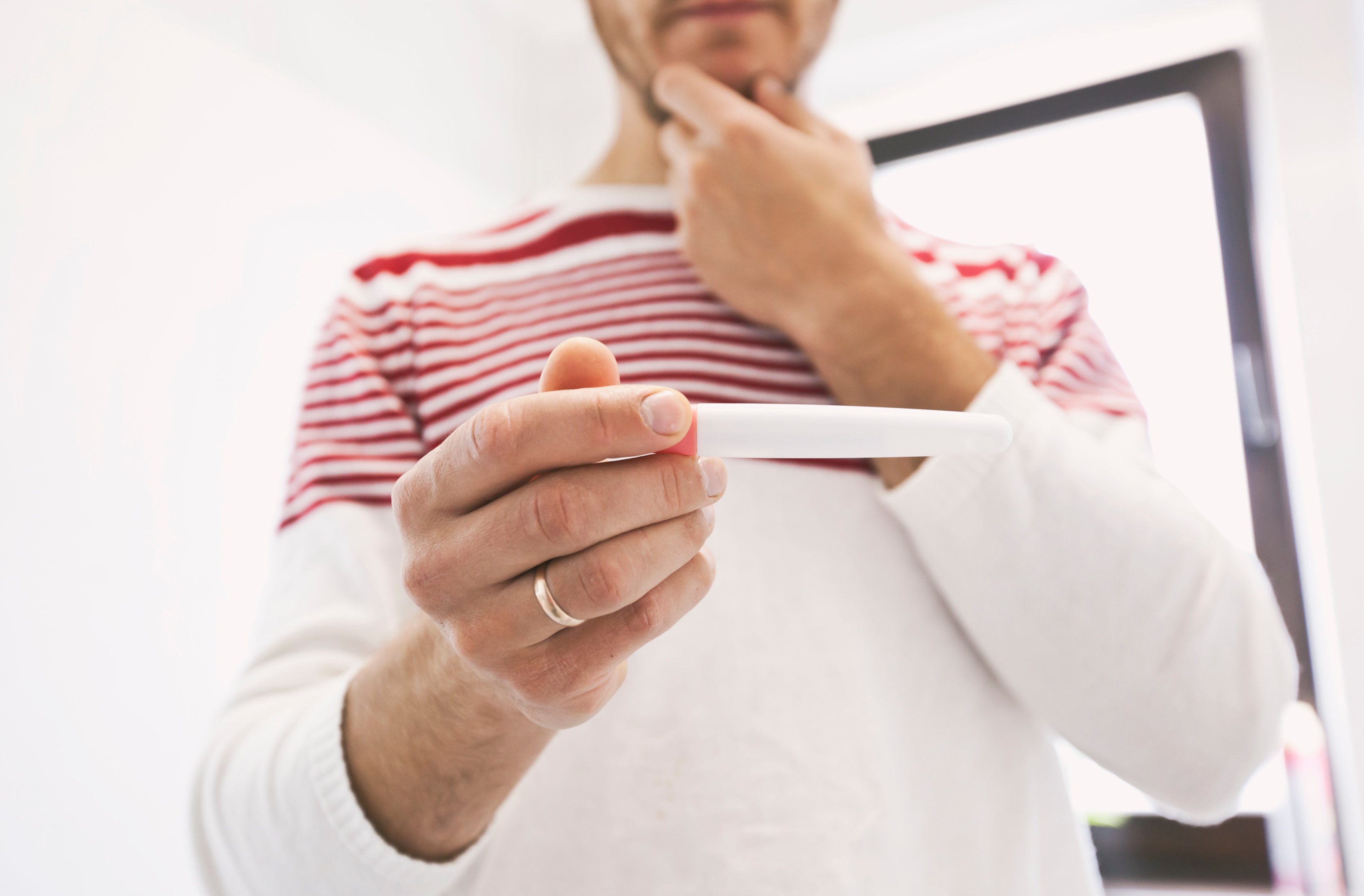How long after sex can you take a pregnancy test?
.png?v=1674665669707)

Related products
An Overview on Pregnancy
It’s natural to feel anxious after unprotected sex and wonder when you can take a home pregnancy test. Pregnancy tests detect the hormone hCG (human chorionic gonadotropin), which only appears once an embryo implants in the womb.
To be pregnant, the egg and sperm must combine after intercourse for a minimum of six days before the egg has become fertilised. The fertilized egg must then develop, travel towards the uterus, and embed itself into the uterine lining for a few days before a pregnancy can begin. So it could take up to two or three weeks from the time you have sex until you become pregnant.
If you want to maximise your chances of pregnancy, try to understand your ovulation cycle timing first. Welzo's pregnancy & ovulation tests can give you a head start into the best days to plan for pregnancy and confirming that you are pregnant.

Understanding Pregnancy Tests
Home pregnancy tests work by sensing hCG in urine. The placenta produces hCG after the fertilised egg implants in the uterine lining, which happens about 6–10 days post-conception. A medical review notes that most tests need roughly 9–10 days after fertilisation to reach the level (20–25 mIU/mL) needed for a positive result. In other words, it takes a couple of weeks after ovulation for a test to register pregnancy. If you test before hCG has built up, you may see a negative even if you are pregnant.
Pregnancy tests are extremely reliable when used at the right time. A test can be done from the first day of a missed period, because before then “levels of the pregnancy hormone might be too low to be detected”.
When to Take a Home Pregnancy Test ?
The timing depends on your menstrual cycle. If your periods are regular and predictable, the simplest rule is to wait until the day your period is due. Most doctors recommend waiting until your period is late to take a home test. This ensures that hCG has had time to rise to detectable levels. In practice, many home tests claim high accuracy even a few days before a missed period, but real-world studies show waiting until the late period or shortly after greatly improves accuracy.
Test results will be more accurate if you take them right after you wake up. This is because the hCG hormone is stronger and more concentrated in the morning. Wait another few days and perform the test again if the results are negative, but you still believe you may be pregnant. Early in pregnancy, HCG almost doubles every two days.
Read more: How many days after ovulation can you test?
If your menstrual cycle is irregular or you’re unsure of your dates, you should count from the last unprotected sex. Waiting roughly 2-3 weeks post-intercourse means that implantation and hCG production should have occurred. Dr Alan Copperman (NYU fertility specialist) also advises taking a first test at 10 days after conception and repeating it 2 days late, reflecting the same timeline in days after sex.
Remember that certain medical conditions, nutrition, or exercise might occasionally cause your period to be skipped or delayed. Although not always indicative of pregnancy, missing your period may warrant taking a pregnancy test for peace of mind.
Risks of Testing Too Early
In reality, taking the test too early (before a missed period) can cut accuracy dramatically. All the sources agree: test too early and you may get a false negative. Both NHS advice and medical reviews emphasise that it’s best to wait until at least the first day of a missed period, and even a few days beyond that if possible.
If you do take an early test and it’s negative, don’t panic. Continue to monitor for your period. If your period still doesn’t arrive, repeat the test in a few days, or see a doctor for a blood test, which can detect lower hCG levels sooner. A blood test in a clinic can confirm pregnancy a bit earlier (as soon as about 10 days after ovulation) but this is usually only needed if results are inconclusive.

Using Pregnancy Tests at Home
When it’s time to test, use the test first thing in the morning, when your urine is most concentrated with hCG. Make sure to carefully follow the kit instructions. Many home tests are very accurate when used correctly. Browse our early detection pregnancy kits that can give results quickly at home. Some “early result” tests claim to detect hCG up to 6 days before a missed period, but even with these you still get the best accuracy by testing on or after the day your period was due.
If the result is positive, that almost certainly means you are pregnant. (Home tests are very unlikely to give a false positive.) You should then contact your GP or midwife to arrange confirmation and antenatal care. Explore our pregnancy vitamins and supplements
If it’s negative and you still suspect pregnancy (missed period, symptoms, etc.), test again in a few days. Alternatively, a healthcare provider can do a blood test or urine test in clinic for added certainty. Remember: a negative test now just means hCG isn’t high enough yet.
Our Most Favoured Pregnancy Tests:
1. Pregnancy Blood Test
At Welzo, our Pregnancy Blood Test is a comprehensive blood test that detects the presence of hCG in the blood of pregnant women.

The results are shipped within 2 days. Click here to order your test kit.
However, if you are not comfortable with blood tests, we have a home-based tests that detects hCG in the urine. All these products are also designed with your safety and hygiene in mind. The cap protects the absorbent tip and keeps it clean until you are ready to use it. The test stick is also individually wrapped for your protection.
2. Clearblue Pregnancy Test Combo Pack of 2
Giving you the benefit of the doubt, we also offer you a double confirmation pregnancy test pack. Clearblue Pregnancy Test Combo pack of 2 - equips you with both, a digital and a rapid detection pregnancy test. Results will be visible in 3-minutes once taken.

While the visual pregnancy gives you a '+' meaning Pregnant and '-' meaning Not Pregnant, the digital pregnancy test gives you a clear "Pregnant" or "Not Pregnant" confirmation written on the screen.
Both tests can be used up to 5 days before your missing period and are over 99% accurate from the day of your expected period. Remember to take these tests on the first urine of the morning, as it contains the highest hCG levels.
3. Clearblue Digital Ultra Early Pregnancy Test
The Clearblue Digital Ultra Early Pregnancy Test is known for its high accuracy. It is over 99% accurate from the day of your expected period and can tell you 6 days sooner than your missed period. 78% of pregnancies can be detected 6 days before your missed period, 93% of pregnancies 5 days before and 99% or more from 4 days before your missed period.

Using the SmartGuard™ technology, this test stick has an extra wide tip with a unique stop light to tell you when you have sampled enough urine. The Smart Countdown helps give you clear results usually within 3 minutes, displaying this as "Pregnant" or "Not Pregnant."
4. Clearblue Rapid Detection Pregnancy Test
This revolutionary design came after extensive research, bagging it a Red Dot design award in 2012. It is designed to offer the easiest experience while giving you results as fast as 1 minute, on the day of your missed period.

The wide colour change tip helps make sampling easier and changes colour from white to pink to let you know you've sampled correctly. The results are as simple to understand as well displaying a '+' for positive results (pregnant) and '-' for negative results (not pregnant, or hCG is not yet detectable.). Buy Clearblue Pregnancy Rapid Detection Test Pack of 2 here.
What if the pregnancy test I took came back negative?
Wait a few days before taking another test if you obtain one negative test result but still think you could be pregnant. You might wish to refrain from having close sexual relations at this time. If your pregnancy test comes back negative and it's been over 21 days since your last unprotected intercourse, there is a high likelihood that you are not pregnant.
After even a second negative pregnancy test and no return of your period, you may wish to have an examination with your doctor if you continue to exhibit pregnancy symptoms. Remember that a period can be delayed by conditions other than pregnancy.
Read more: How to boost fertility in your 30s?
How frequently do false pregnancy test results occur?
False-negative results, which can be either false positive or false negative, are typically the result of improper use of the test. Testing too soon is the leading cause of a false-negative result. You may also receive a false-negative result if you perform a home test improperly using excessive or too little urine. To ensure that you receive an accurate result, it's crucial that you adhere to the instructions on your test kit.
Could a positive test be inaccurate?
False positive results are uncommon, but they can occur. If you experience chemical pregnancy or miscarry soon only after fertilized egg adheres to your uterine wall, this might be the issue.

Recognising Early Signs of Pregnancy (Beyond a Test)
While a pregnancy test is the most definitive way to confirm pregnancy, your body might start showing some subtle signs even before you can get a positive test result. These signs of early pregnancy before missed period can vary greatly from person to person and can also be indicative of other conditions or your normal menstrual cycle approaching. It's important to remember that these symptoms are not a substitute for a test.
Common very early pregnancy symptoms might include:
- Fatigue
- Nausea or morning sickness (can occur at any time of day)
- Tender, swollen breasts
- Implantation bleeding (light spotting around the time implantation might occur)
- Increased frequency of urination
- Sensitivity to smells
- Food cravings or aversions
- Mood changes
- Bloating
It's important not to rely solely on these very early pregnancy symptoms 1 week or two after potential conception, as they can be misleading and caused by factors other than pregnancy. A pregnancy test is necessary for confirmation.
Supporting your overall wellbeing during this time is important. Explore our Well woman range for supplements that can support women's health.
What to Do After Unprotected Sex if You're Not Trying to Conceive
If you've had unprotected sex and were not trying to get pregnant, there are immediate steps you can consider to prevent pregnancy or address potential concerns.
Considering Emergency Contraception (The Morning After Pill)
Emergency contraception is a method to prevent pregnancy after unprotected sex or contraceptive failure. It works by delaying or preventing ovulation.

There are different types available, and their effectiveness windows vary. It's crucial to remember that the sooner you take emergency contraception - after unprotected sex, the more effective it is. Understanding the emergency contraception effectiveness window and morning after pill timeline is key.
If you've had unprotected sex and want to prevent pregnancy, it's important to act quickly. Learn more about and access the Morning After Pill through our confidential service.
Understanding Your Contraception Options for the Future
Following a situation involving unprotected sex, it's a good time to review your regular contraception methods to prevent future unplanned pregnancies. There are many different options available, including pills, patches, injections, implants, and IUD's, each with its own benefits and considerations.
Discussing your lifestyle, health, and preferences with a healthcare professional can help you choose the most suitable long-term contraception options.
For information on various methods of regular contraception, please visit our Contraception page.
Can Emergency Contraception Affect Results?
Emergency contraception, like the morning-after pill, doesn’t affect hCG levels but can alter your cycle, potentially delaying your period. If you’ve taken emergency contraception, wait at least 21 days before testing or use a Pregnancy Test Kit to confirm.
Understanding Accuracy
| Test Type | Detects hCG | When to Use | Accuracy |
|---|---|---|---|
| Standard Test | 20–25 mIU/mL | From day of missed period | 99% |
| Early Test | ~10 mIU/mL | Up to 6 days before period | 70–85% early, 99% on missed period |
Note that urine concentration, test sensitivity, and timing all impact results.
Bottom Line:
Getting a pregnancy test if you suspect you could be pregnant is a good idea. How early home tests can detect pregnancy can vary. An at-home test can frequently yield a positive result as soon as 10 days after fertilization. Wait to take the test until after you've missed the period to obtain a more accurate result.
Order a pregnancy test with Welzo today. Click to order a Blood Pregnancy Test or the standard urine tests such as Clearblue and Alere.
















 Rated Excellent by 26,523+ Reviews
Rated Excellent by 26,523+ Reviews